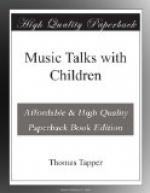Some day, when you read about the great composers, you will be delighted with the pictures of their home-life. You will see how they employed music every day. In all cases, as we study them, we learn how very much they have sacrificed for the music they love, studying it daily because of the joy which it yields them. We see them as little children, eager to be taught, wanting to listen to music, and to hear about it. Many of the composers whose child-life is thus interesting were children in very poor families, where things were neither fine nor beautiful, where the necessary things of life were not plentiful, and where all had to be careful and saving so that every bit should be made to go as far as possible. The eagerness and determination of some children in music-history is really wonderful. It is the true determination. And you are not surprised, in following it, to note that it leads the children who have it into lives of great usefulness.
All through the life of Handel we find determination running like a golden thread. He was just as determined to be a musician as Lincoln was to get an education when he read books by the firelight. Handel’s father was a surgeon, and knew so little about music that he failed entirely to understand the child. He not only forbade the boy to study music, but even kept him away from school that he might not by any chance learn to read the notes. But one who was in future years to befriend homeless children and to write wondrous music for all the world could not be held back by such devices. By some means, and with friendly assistance (perhaps his mother’s), he succeeded in smuggling into the garret a spinet, which is a kind of piano. By placing cloth upon the strings he so deadened the wires that no one downstairs could hear the tones when the spinet was played. And day after day this little lad would sit alone in his garret, learning more and more about the wonders which his heart and his head told him were in the tiny half-dumb spinet before him. Not the more cheerful rooms down-stairs nor the games of his playmates drew him away from the music he loved, the music which he felt in his heart, remember.
One would expect such determination to show itself in many ways. It did. Handel does not disappoint us in this. All through his life he had strong purposes and a strong will—concentration—which led him forward. You know how he followed his father’s coach once. Perhaps it was disobedience,—but what a fine thing happened when he reached the duke’s palace and played the organ. From that day every one knew that his life would be devoted to music. Sometimes at home, sometimes in foreign lands, he was always working, thinking, learning. He is said, in his boyhood, to have copied large quantities of music, and to have composed something every week. This copying made him better acquainted with other music, and the early habit of composition made it easy for him to write his thoughts in after years. Indeed, so skilled did he become, that he wrote one opera—“Rinaldo”—in fourteen days, and the “Messiah” was written in twenty-four days.[63]




